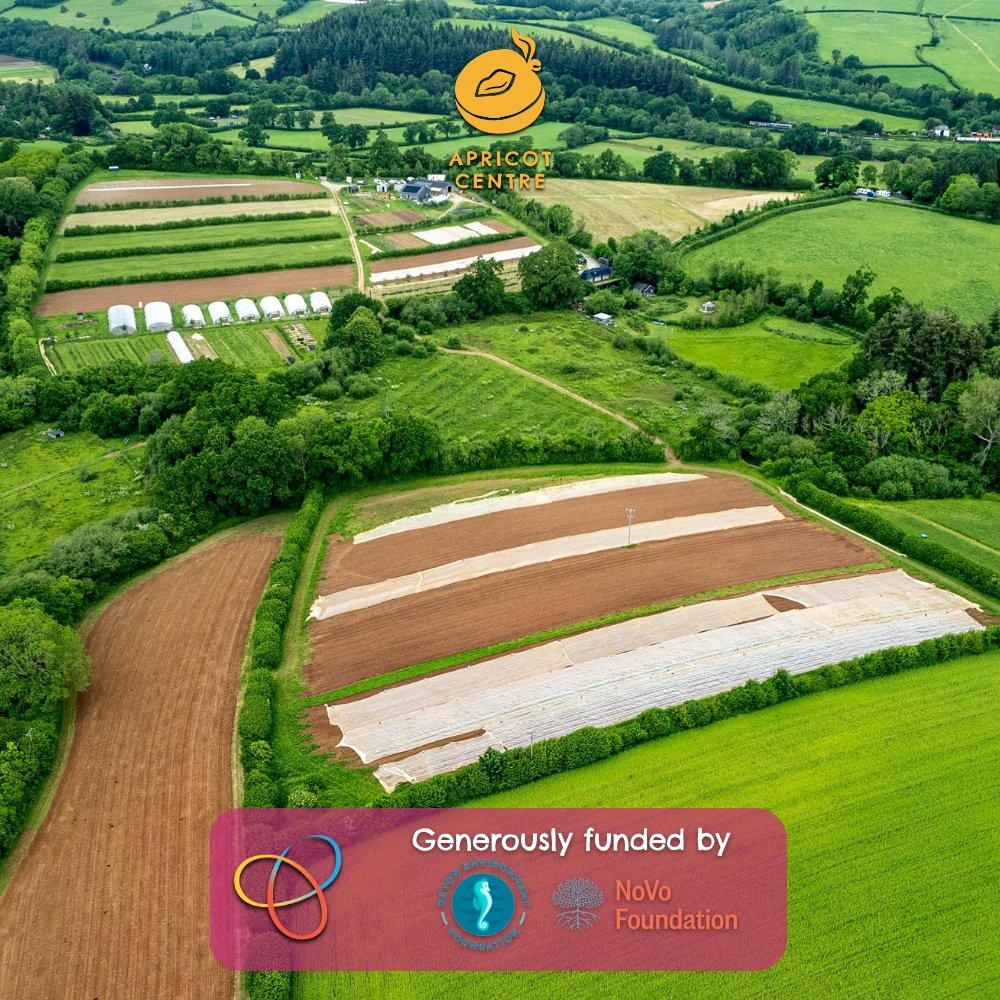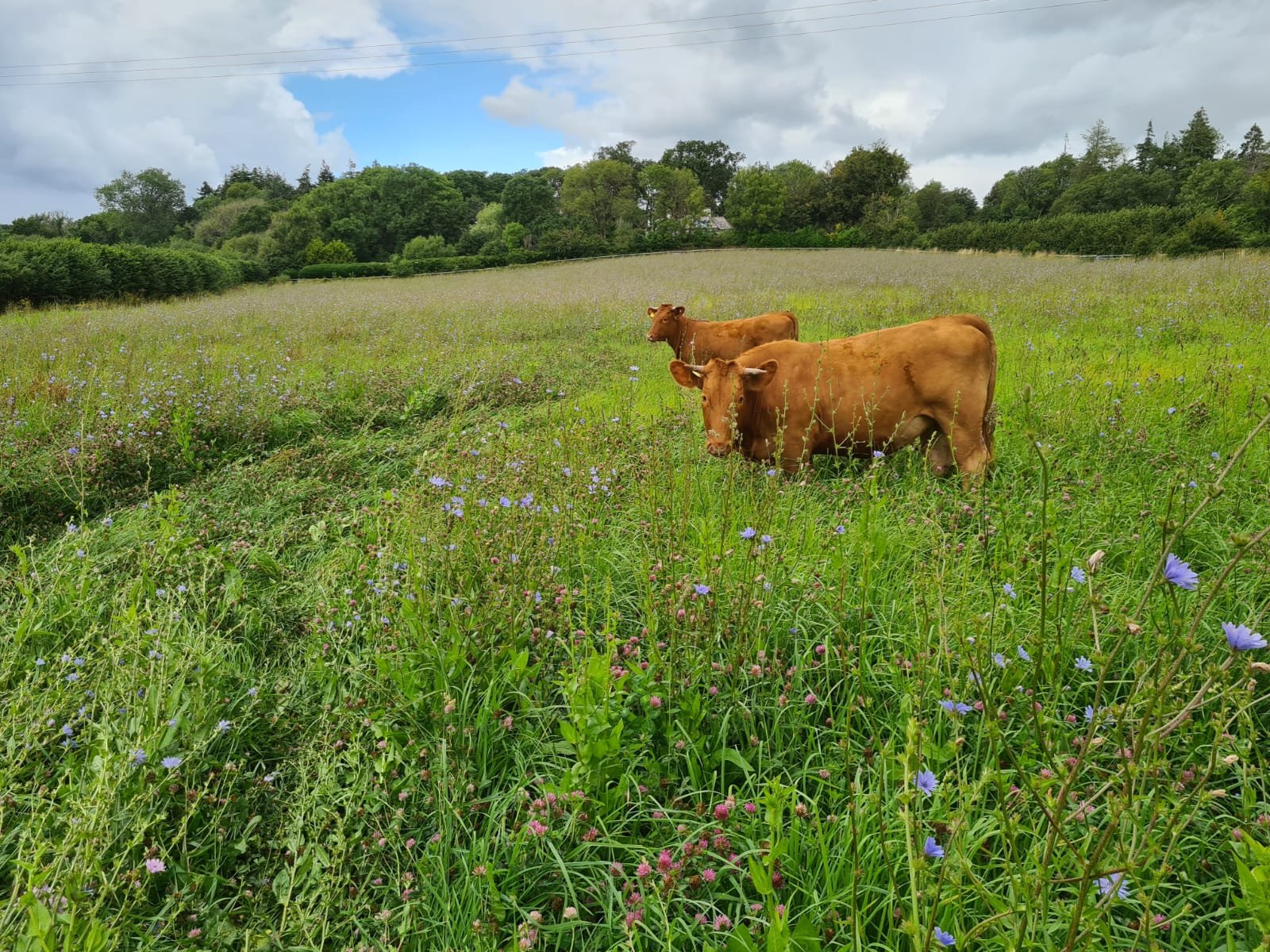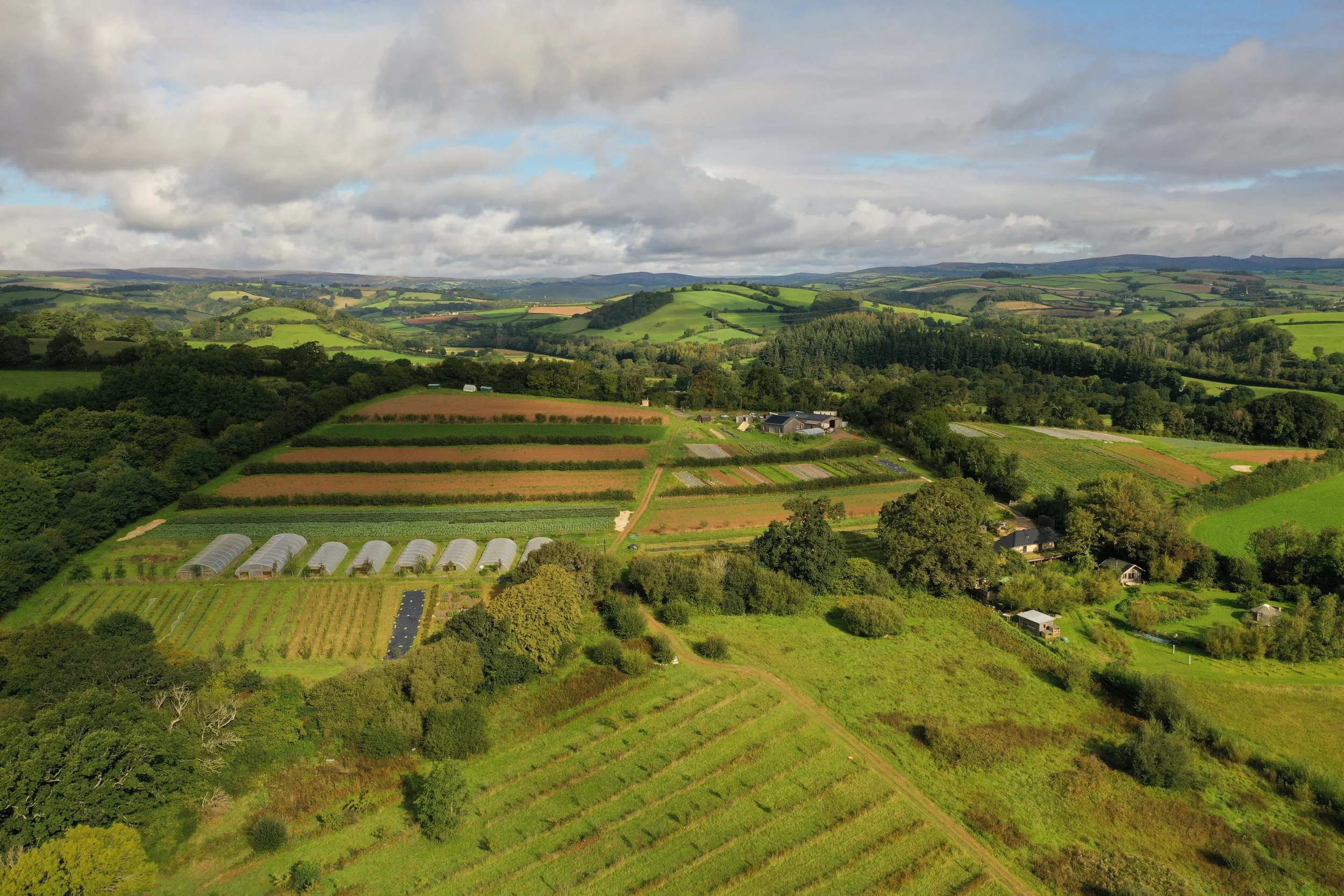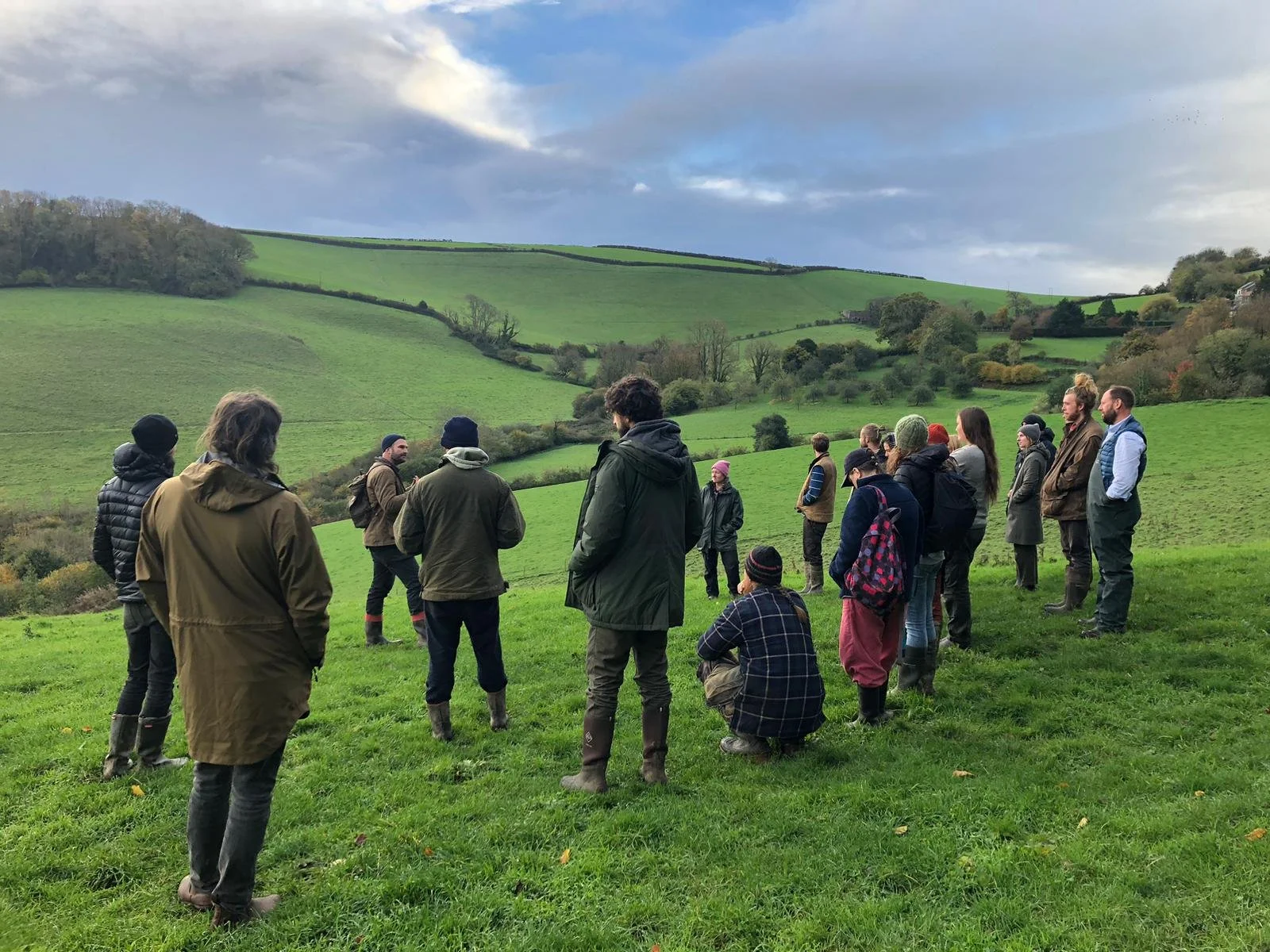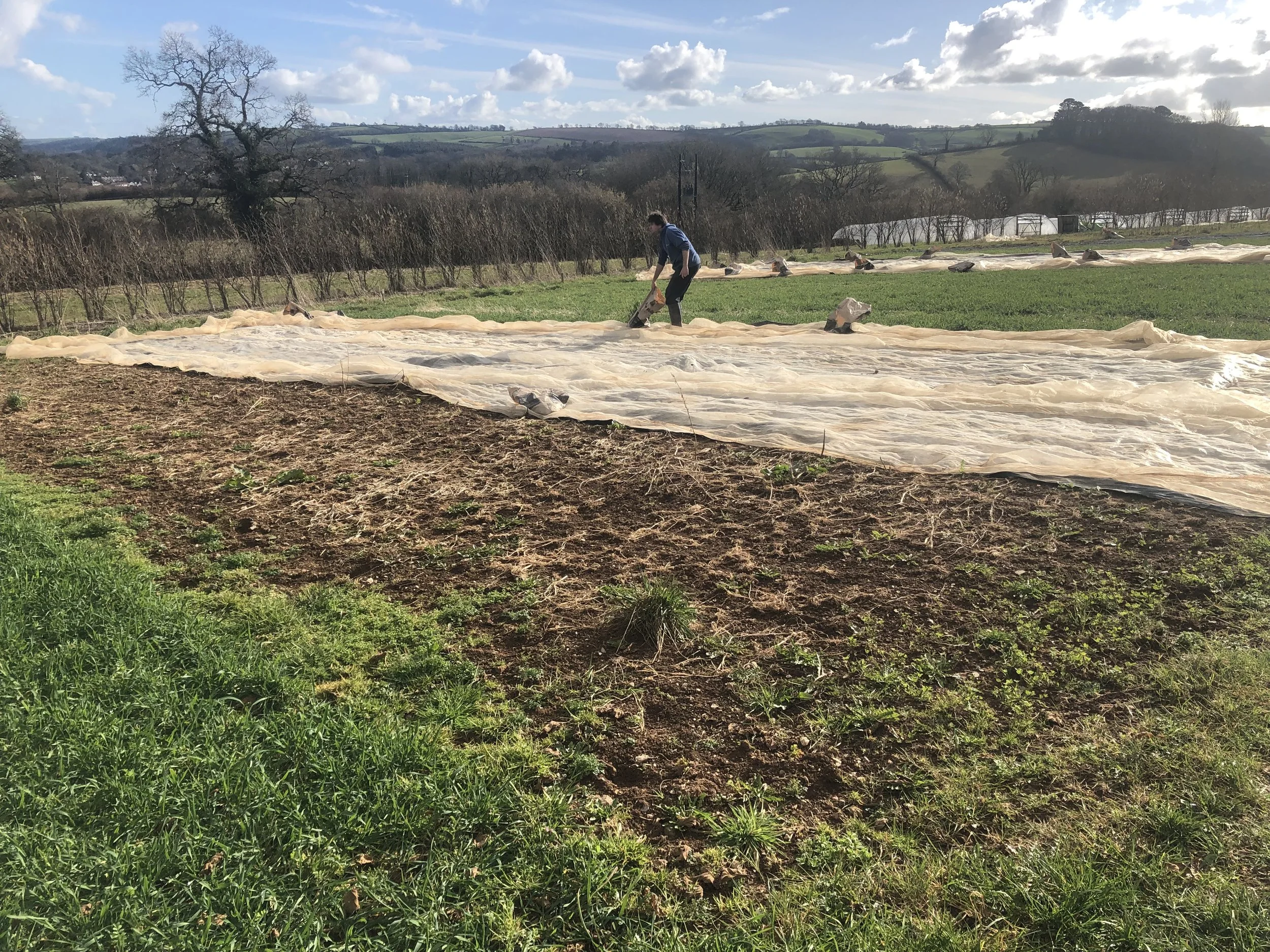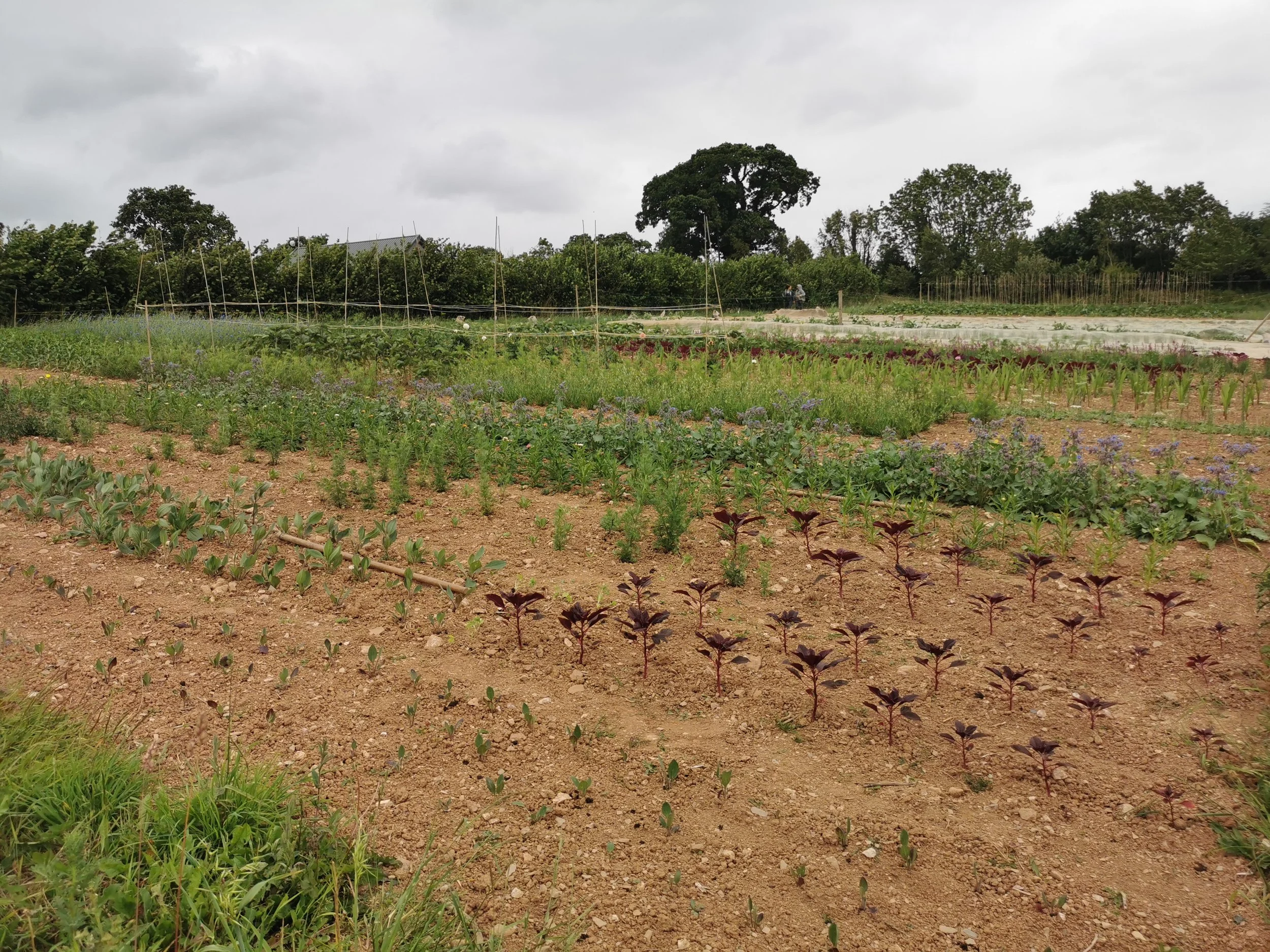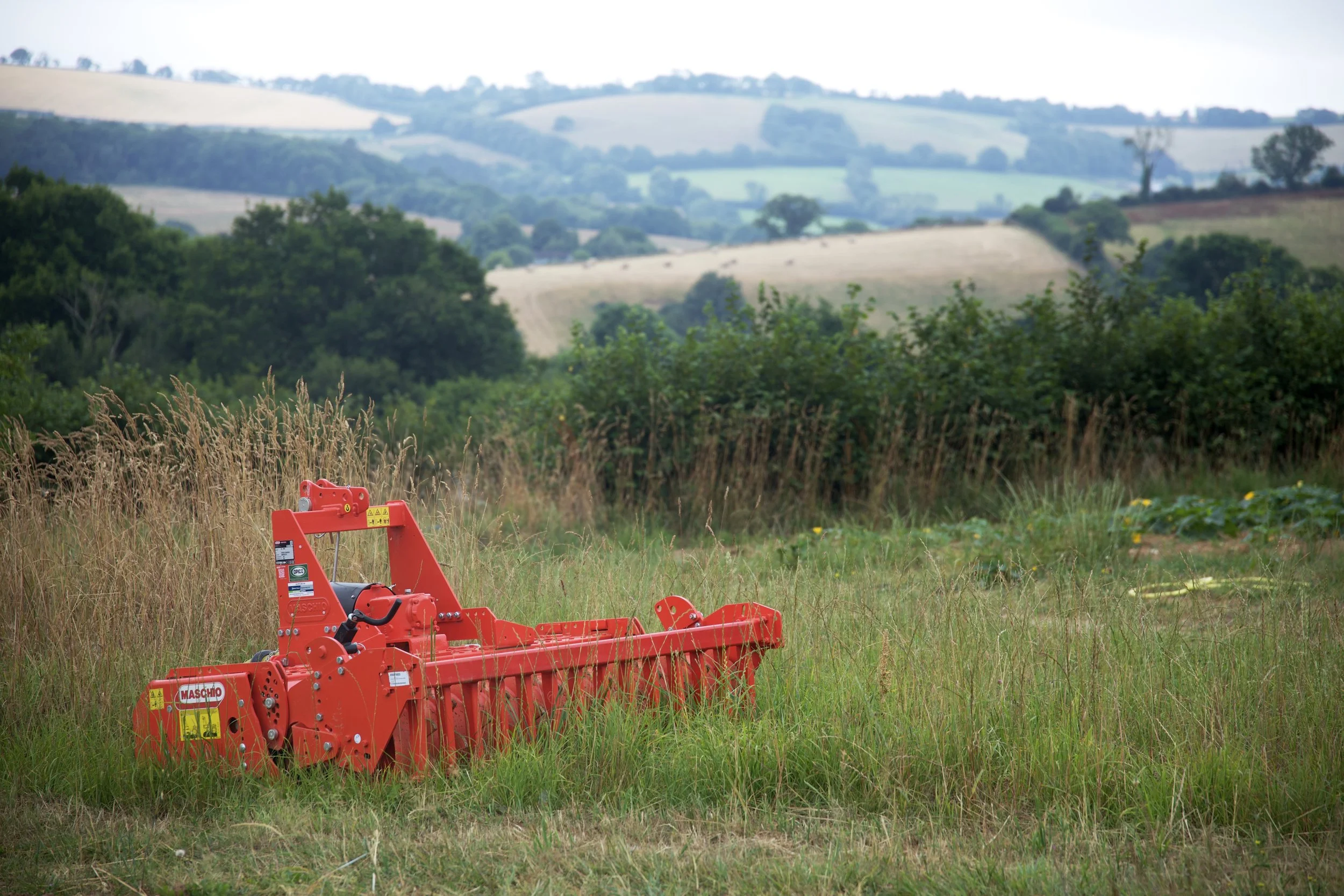Level 3 Diploma in Regenerative Land-Based Systems: Agroecological Food & Farming
Free for participants and certified by Crossfields, the Apricot Centre @Huxhams Cross Farm presents the Level 3 Yearlong Diploma programme in Regenerative Land-Based Systems to help people transition into, or upgrade their skills in, the world of agroecological, organic and regenerative farming methods.
APPLICATIONS ARE NOW OPEN FOR THE 2026 COHORT
Applications will close 1st of September 2025 so that work experience placements can be sorted in time.
The Apricot Centre CIC is once again offering its flagship yearlong Level 3 diploma programme with land based learning and work experience accompanying academic study. The programme runs from January to December for 5 days a week (4 days on a work experience placement farm and 1 day academic learning at the Apricot Centre). The traineeship offers an authentic opportunity of working on a farm, in a woodland, or with a food producer alongside a free level 3 qualification in Regenerative Land Based Systems as well as a Permaculture Design Certificate.
The level 3 diploma qualification is Ofqual-regulated and awarded by the Crossfields. The Permaculture Design Certificate is awarded by the Permaculture Association.
The academic course itself is valued at £7000 and is provided FREE as part of the training alongside the work experience. It is made possible by generous funding by the NoVo Foundation through Devon Environment Foundation.
As a student, you will receive:
An academic Level 3 Diploma course;
Work experience placement on a host farm;
Student accommodation on or near your placement as part of the academic course;
Pastoral care, tutoring and free mental health counseling upon request;
Free training resources such as books;
Free access to relevant themed events at the Apricot Centre (e.g. book talks, film screenings)
Support for PPE clothing;
Support for living expenses during the course*;
Access to a bursary fund which can be applied for during the course to help support you during the year;
Access to a bursary fund which can be applied for to help set up a project after graduation;
Access to our student and later our alumni community for social connection, networking, further learning and jobs & opportunities.
* Students will be offered £80 per week training expenses. Students will need to collect and keep expense receipts for the amount the allowance, in accordance with their agreement with their host.
Designed for people 19+, we welcome applications from all diverse backgrounds and life experiences. You will need to have previous qualification of GCSE grade D or above or equivalent. (If you are unable to meet this requirement please contact rachelphillips@apricotcentre.co.uk to discuss alternatives.)
As we are unable to sponsor students visas, the course is only open to people who have legal right to live and work in the UK (valid visas, (un)limited leave to remain ("(pre-)settled status"), citizenship). The course extends beyond the 6 months allowance of EU citizens.
PLEASE NOTE MOST PLACEMENTS REQUIRE STUDENTS TO DRIVE AND HAVE ACCESS TO A CAR. YOU WILL NOT BE ASKED TO PERFORM WORK DRIVING DUTIES AS PART OF YOUR WORK EXPERIENCE - IT IS SIMPLY DUE TO RURAL ACCESS AND LACK OF PUBLIC TRANSPORT.
In proud cooperation with…
THE COURSE INCLUDES THE FOLLOWING MODULES:
-
This unit introduces the concepts and methodologies of regenerative land based systems, why they are needed to offset climate change and how to evaluate their impact. In a time of climate change, biodiversity loss and the need to produce healthy food, regenerative food systems are able to meet these challenges. Regenerative systems are a complex set of farming and land based methodologies. In this unit, learners will be introduced to the breadth of these methods and how the impact of them can be assessed in a land based business.
-
This unit introduces learners to soil science concepts and practice, including the carbon cycle and soil biome as key components of regenerative land based systems. Learners will be introduced to recent changes in the understanding of soil science, to include soil ecology and the carbon cycle. They will understand how to manage soil to mitigate and adapt to climate change. They will understand the importance of soil science as a key concept in how to manage land in regenerative systems.
-
This unit introduces learners to the science and ecology of plant and crop growth, which are key components underpinning the management of regenerative land based systems. Learners will understand that regenerative cropping systems are based on ecology, the carbon cycle, and a deep understanding of a reciprocal and circular model of food production. Learners will be introduced to these concepts in the context of crop production and how they can be managed to produce food.
-
This unit introduces learners to the science, nutrition and behavioural aspects of holistic livestock management in regenerative land systems. Learners will understand how livestock can be incorporated into regenerative systems, to improve the soil ecology and biodiversity. Learners will understand how livestock can be managed to reduce their carbon footprint, and to fit into complex carbon and nutrient cycles, and how to maximise their health and welfare in a land based system. The unit will include apiculture and functional biodiversity on a system.
-
This unit introduces learners to the principles and ethics of Permaculture. Learners will be introduced to the origins and principles of Permaculture as a design methodology for designing sustainable land and non-land based systems. Learners will understand how Permaculture is part of a toolkit that can be used for creating regenerative land based systems. Learners will develop an understanding of how Permaculture design practice, ethics and principles are applied to the built environment as well as develop a range of personal and interpersonal skills that inform how they can use these skills in ethical and regenerative systems. This unit leads to a Permaculture Design Certificate (PDC) qualification awarded by the Permaculture Association alongside the Level 3 qualification.
-
Discover how Nature and regenerative farming helps heal us not just physically, and how you can provide more than just food from your land.
-
In this unit, learners will be introduced to the concepts and types of agroforestry systems and their use in regenerative land based systems. Learners will explore how trees are incorporated into the farmed landscape as silvo-arable, silvo-pastoral and silvo-horticulture systems, as well as food forests. They will identify suitable tree species for different soils and sites, and understand the benefits and challenges of using trees in a farmed landscape. They will understand how to design effective agroforestry system for a farm.
-
In this unit, learners will be introduced to provide an introduction to simple business planning methods, business structures and community supported agriculture systems. Learners will explore how regenerative land based systems aim to re-localise sales and shorten the supply chain, and the methods of achieving this. Learners will understand that businesses need to be economically regenerative, pay fair wages, and to become financially sustainable in the long term. Learners will be able to explore how to model business “for purpose” rather than profit.
-
Numbers are not enough for success; you will also learn how to plan the long term future, funding and running of your land-based business.
-
In this unit, learners will be introduced to the principles and practices of Biodynamic farming systems. Learners will explore how Biodynamic farming was the first ecological farming system to arise. They will also understand how it offers a unique approach to farming and food systems. Learners will gain an overview of this system, its principles and practices and its codification, and how it differs from organic systems.
-
In this unit, learners will be introduced to all aspects of water including water cycles and the management and usage of water as part of a whole farm approach. Learners will explore how healthy water management can provide balance in the storing and use of water. They will understand how many traditional ways to hold the water in the landscape that were practiced indigenously all over the world are being rediscovered and redeployed within a modern understanding of geology and the water dynamics of climate and farming. Learners will understand how to apply water management principles it in the context of a farm.
-
In this unit, learners will understand how the quality of food from a regenerative system differs from the quality of food from and industrial food system. Learners will understand how sourcing food from a regenerative system affects consumer health in relation to increasing the range and amount of fresh fruit and vegetables they eat. They will explore how Industrial foods are often are lower in nutrient levels and secondary metabolites as they contain pesticides, and high levels of nitrates, both of which impact human health. Learners will also explore the complex issues of food poverty in regenerative systems.
-
Students spend four days per week on their host farm, learning directly on the land. They write a learning log of their time, as well as have a chance of applying what they have learned on the course directly with the guidance and support of their hosts.
THE YEAR LONG TRAINEESHIP WILL PREPARE YOU TO:
Work in agroecological farming or small holding type settings using organic and regenerative practices;
Work in post-harvest roles such as food processing in agroecological food products;
Work in community supported agriculture or the circular food economy;
Work in agroecological land based systems that aim to regenerate the landscape and the soil;
Progress into higher education courses such as our Level 4 Regenerative Food Systems (starting January 2027) and degrees in relevant areas.
FURTHER BENEFITS OF THE PROGRAMME
Benefits for the farmer
Farmers can benefit greatly from hosting work experience placements as they can provide valuable hands-on experience in sustainable land management practices. By taking on students, farmers have the opportunity to share their expertise and passion for farming with the next generation of agricultural professionals.
Students also bring fresh perspectives and ideas to the farm, helping farmers to stay current with new advancements in farming practices. This exchange of knowledge can lead to improved efficiency and productivity on the farm.
In addition, hosting students can help farmers build strong relationships within the community and industry. By opening their farm to students, farmers can become seen as leaders and mentors in the agricultural community, gaining recognition and respect for their commitment to education and sustainability. They also have a chance to connect with other hosts in the field, expanding their network. Hosts are also welcome to attend any specific teaching days with topics of interest.
Overall, hosting student work experience placements can be a rewarding experience for farmers, allowing them to give back to the industry while also receiving valuable assistance and fresh ideas for their farm operations.
Benefits for the student
A year long course gives a real experience about what it is to be a grower, livestock farmer or woodland manager. Learning from an experienced person on the land will give you confidence and valuable practical skills. Coupled with the Level 3 qualification’s theoretical and practical knowledge in Regenerative Land Based Systems, you will have an excellent basis to start or continue your land based career.
Benefits for the green sector, food, farming and land based businesses
The aim of this course is to train the next generation of farmers and growers in agroecological and regenerative farming systems. This will aid farms and woodlands to sequester carbon and support biodiversity whilst still producing local food and other produce.
IS THIS COURSE FOR ME?
Every year we are extremely fortunate to have a wide range of applications from diverse backgrounds that far exceeds the capacity of the course, usually by four- or five-fold. The selection process is one of great care, deliberation and difficult decisions, both for the Apricot Centre and for the work experience placements. We work hard to make sure we find the best fit for everyone.
It is important to know that the course has both a strong academic element that requires in-person attendance (at least 80%), study and assignment writing requiring 4-5 hours per week (it is not an NVQ), as well as the work experience placement which is physically, and especially on long, dark rainy winter days, psychologically demanding (which, to be fair, is the reality of farming). While we make every effort and go above and beyond to support students through the course and accommodate any learning difficulties, and the student community itself is a wonderful social network, prospective applicants should reflect on their ability to make such a commitment for a year, from physical, psychological, social, academic and financial perspectives. There is also no guarantee that you will be able to stay and find work in the field in South Devon after the course - most of our alumni go far and wide to carry the torch of agroecology and settle in jobs elsewhere.
The course alternates between heavy social interaction during course days and, depending on your placement, working in smaller teams, potentially with another student or students at your host farm. In some cases, you may be living in the same accommodation as other students or on site with other employees. In order to be able to get the most out of the course, please reflect on how well you work with others and whether you are able to handle any interpersonal conflicts in an appropriate manner.
If you live in the area, you are, of course, able to live at home and commute to your placement. If you are already a farmer, you may be able to “self-host”, just have a conversation with us.
If you are contemplating exploring working on the land but do not wish to commit to a course as long and intensive as this, we recommend exploring volunteering opportunities, WWOOF-ing and WorkAway trips (both in the UK and abroad) to dip your toes in and see if land-based work really is for you. If you are ready to commit after the exploration, we will most certainly welcome your application in any future cohort.
If you are unsure whether the course is for you, we are very happy to have a conversation with you and hopefully help make the best possible choice for you. Please don’t hesitate to get in touch!
HOST PLACEMENTS
This is where we will list the hosts for 2026 as they are confirmed. We are currently going through a rigorous selection process to create a list of hosts for 2026.
You will be asked to pick a first and second choice host on your application form. If you are not accepted by, or after interview would rather not be with, your choice of hosts, you will be informed of remaining host places and can choose to apply to them. Please do not try to make more than two host applications in one go, it never works out well in our experience.
Consider the hosts you wish to be with most and give detailed, tailored reasons in your applications for why you want to work with them. Hosts are far more interested in your passion, commitment and desire to work in the field, like to see if you’ve “done your homework” on them, and applications like “I walked [i.e. trespassed] through your farm and polytunnel and thought it was very nice.” are likely to be out shined and go to the bottom of the pile very quickly (yes, that was a real, entire application).
If you perhaps wish to arrange a visit to your prospective hosts outside of the application process, this has to be of your own initiative. We cannot arrange any host visits nor pay towards any visits or interviews you arrange, should you need to travel.
APPLICATION PROCESS
Please click on the “Apply for…” button at the top or below and complete the application form as best you can. If you need support to complete the form, please email/call our Education Administrator and we will help you with application process.
The applications will close 1st of September 2025.
Upon submitting your application, you will receive and automated response that is confirmation of our receipt.
Soon after the deadline, when applications close, you will receive an update whether you are accepted to the academic part of the course (1st round of application).
If you are not accepted, you will receive an email which will notify you of the decision and offer resources and alternatives for you to explore.
If you are accepted on the academic course (1st round of application), you will receive an email informing you of this, and your application will be passed on to your first choice and second choice of hosts.
Your prospective hosts will contact you to arrange an interview. The initial interview will likely be held either online or via phone, should you not be in the area. If successful, an in-person interview / few trial hours will be arranged, for which you will need to travel to your hosts. We will ask hosts to have days close to each other to allow for multiple interviews in one trip. Please note, we are unable to arrange host viewings prior to interview (you are welcome to privately arrange with the host yourself) or pay towards travel expenses for these interviews.
If you are successful, you will be notified by your host and receive a welcome email from us with further information.
If you are unsuccessful, you will be notified by your host(s) and we will offer you further choices of hosts for placements that are still available. We may have a phone call with you to explore possibilities. If you apply to a new host, the process will start again.
If you are unsuccessful in your host applications, you will receive an email which will notify you of the decision and offer resources and alternatives for you to explore.
If you do not receive an automated response when applying, or if you have not heard from us by the second week of September, please make sure you check your spam folders and consider whitelisting our domain. If there is still nothing, please do get in touch.
As previously said, should you require any assistance of have any questions, please contact us on:
education.admin@apricotcentre.co.uk
01803762253
What is happening with Agroecological Apprenticeships?
We have previously mentioned apprenticeships. Our desire and goal continues to be the setting up and spreading of an Agroecological Apprenticeship scheme. At the moment, the current political and economic climate and the changes it is producing is, unfortunately, not conducive to this dream. As the Institute for Apprenticeships and Technical Education (IfATE) is defunct as of 1 June 2025 and both absorbed and transformed into the newly established Skills England as of 2 June 2025, priorities have been recalibrated. The work continues with the current and new partners to try and further the scheme’s establishment. At present, we have promise that the scheme will be considered in 2026, which, if all things are successful and smooth, can mean the starting of apprenticeships in 2028. Until then, we have made the decision and secured the funding to continue our current traineeship programme, as no other such scheme currently exists that could fill the gap. We thank everyone who is with us for their continued support as we work hard to evolve the field of Agroecology and help train the next generations of farmers and growers.

